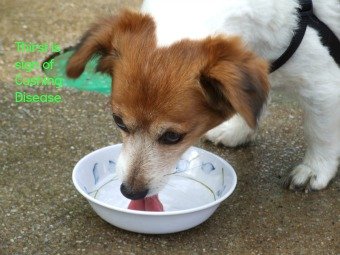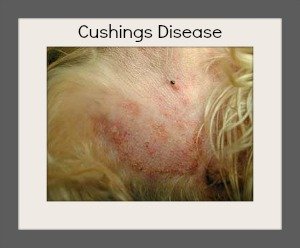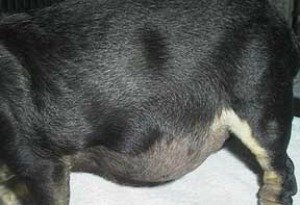Cushing's Disease In dogs Can Be Fatal!

Cushing's disease in dogs can be very difficult problem to deal with.
It is categorized as a overproduction of the cortisol hormone hormone that is created in the adrenal glands, which is located in the abdominal area of dogs.
It is a disease that is quite common in dogs, not often seen in cats.
There can be many implications that come with the overproduction of cortisol.
The hormone is responsible for functions within many of the organs in your dog's body and a number of different symptoms can occur, as a result.
It is believed to be caused by a tumor in the adrenal gland, or over production by the hormone controlling the adrenal glands.
Symptoms Of Dog Cushing's

The most common symptoms that dogs experience with Cushing's disease are hair loss, a huge increase in thirst and subsequently in the amount of water that they drink, and as a result, an increase in the amount of times they need to urinate throughout the day.
This causes a pot-bellied appearance that changes rapidly and can easily bruise the animal.
Other symptoms commonly associated with the condition include having a thin skin and coat, calcium deposits that may be visible in several places under the skin, the wasting away of muscle tissue, and sudden mood changes.
Each of these symptoms is very serious and can lead to decreased enjoyment of life for your pet. A side of Cushings syndrome that few people are aware of.
Steroids Affect The immune System

Luckily, there are a number of different treatments that have been proven to be effective in recent years, which can help to lessen the symptoms associated with Cushing's disease in dogs.
Often Cushing's disease in dogs will be misdiagnosed or confused for something else.
One popular way for vets to treat the variety of symptoms is by using steroids, which unfortunately will have a price tag attached, and can affect their immune system long term. This can lead to some very serious problems down the road, if it is not dealt with quickly and efficiently.
Courtesy of Long Beach Animal Hospital
Changing Diet For Canine Cushing's Disease!

Many vets now hold that the best way of dealing with Cushing's Disease in dogs is through diet. This is considered the best way to alleviate the symptoms of this disease. I recommend the following changes in their diet to improve their quality of life while dealing with this disease.
* Include high levels of protein!
* Include low levels of fat!
* Include low levels of purine!
* Include the proper amount of calcium!
* Include sufficient potassium and sodium in their diet!
* Include an adequate quality of water in their diet!
* Include the correct amount of amino acids so their kidneys will stay healthy
Courtesy of Long Beach Animal Hospital
Herbal remedies Do Work On Cushing's Disease!
People make a mistake in thinking that a herbal remedy can not help a dog with Cushing's disease. Dogs with Cushing's can be very difficult to deal with, but with proper diet and the right herbal remedy, a dog with hypothyroidism can show dramatic improvement overtime. Holistic vets agree that appropriate herbs and diet can be very successful in this situation.
Canine Cushing's disease is a very serious problem and afflicts certain breeds of dogs more than others, and thus emotionally affecting many families. There are, however, some effective treatments that are available which can lessen the effect of these conditions. Canine Cushings disease in last few years can now be dealt with on natural level.
Return of Cushings Disease in dogs
I want thank The Long Beach Animal Hospital for there donation of the photos I have on this website they are great. You can learn more about this great Hospital at http://www.LBAH.com






